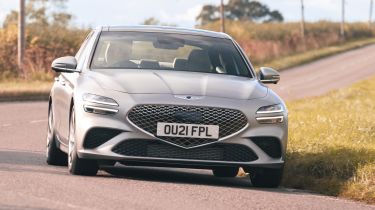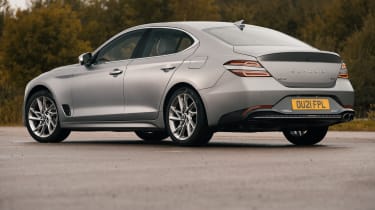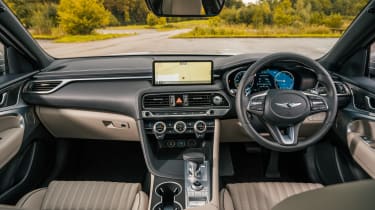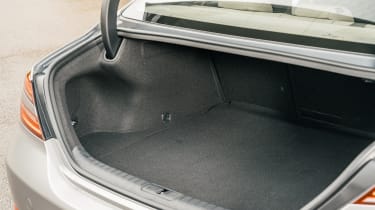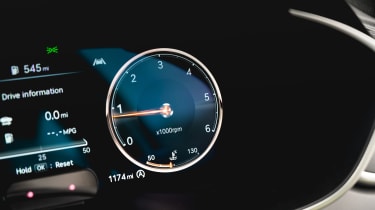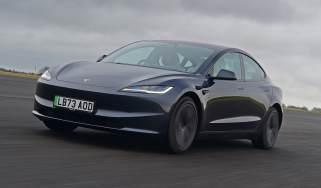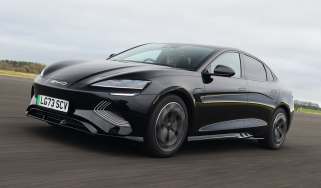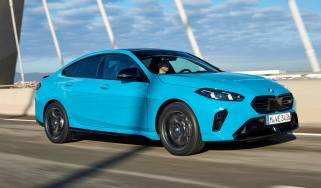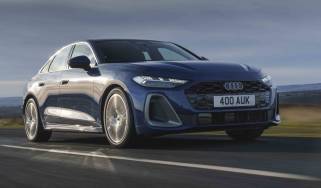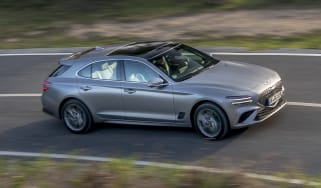Genesis G70 saloon review
"The Genesis G70 is a comfortable new contender in the hotly fought compact executive class but it’s compromised in some key areas"
Pros
- Comfortable
- Impressive handling
- Aftersales service
Cons
- Running costs
- Small boot
The Genesis G70 is a new four-door saloon rival to the Audi A4, BMW 3 Series and Mercedes C-Class, along with more unusual alternatives like the Jaguar XE, Volvo S60 and Volkswagen Arteon. It's the latest arrival in the UK from fledgling brand Genesis, which is the upmarket offshoot of Hyundai, but the G70 has already been on sale elsewhere in the world for a few years.
Its arrival here coincides with a significant facelift to ensure the G70 doesn't feel dated upon arrival. It certainly looks fresh, with Genesis' bold 'G-Matrix' grille design, split headlights and some more aggressive details for the Sport Line trim level, including black 19-inch alloy wheels.
Inside, the materials, including plastic trim and metallic surfaces, all feel very high quality; switches and buttons feel sturdy and quilted nappa leather upholstery also lifts the ambiance. There are, however, a few signs of the G70's age, with some features that don't look as up-to-date or as impressive as those found in the brand's newer cars, like the G80.
Engines are straightforward, with either a 2.2-litre diesel or a 2.0-litre petrol under the bonnet, both of which are turbocharged and send power to the rear wheels. These offer decent performance but aren't especially fuel-efficient, making them a hard sell for company-car drivers that represent a good chunk of the car’s audience.
For the time being, Genesis is instead hoping to attract style-conscious buyers who love the idea of the brand's concierge service. When servicing is required, the car will be collected from your home or office and a courtesy car left in its place.
MPG, running costs & CO2
Executive saloon drivers often rack up big miles, so the diesel version is likely to make up a good proportion of sales thanks to its fuel economy of up to 44.5mpg. This is somewhat off the pace of rivals, however, with the BMW 320d able to return up to 60.1mpg.
The 2.0-litre petrol is also rather thirsty, with an official figure of up to 35.4mpg, which can all too often dip below 30mpg on short runs or if you drive with enthusiasm. With CO2 emissions of 181-201g/km for the petrol and 166-173g/km for the diesel, both sit firmly in the top Benefit-in-Kind (BiK) band for company-car drivers. Unlike the Mercedes C-Class and BMW 3 Series, there's no option of a plug-in hybrid version to bring this CO2 figure down.
More reviews
In-depth reviews
VED (road tax) will cost the standard annual rate but Luxury trims with a few options ticked and all Sport versions sit above the £40,000 mark, so they incur a surcharge from years two to six.
Engines, drive & performance
Drivers are likely to be very impressed with how the G70 feels from behind the wheel. The Kia Stinger has already established itself as an impressive sports saloon and the Genesis feels similarly well-balanced and confidence inspiring, with direct steering and supple suspension that flows with the road. It can't topple the BMW 3 Series but then neither has any other rival.
The 241bhp petrol engine and eight-speed automatic transmission feel unable to make the most of the talented chassis, however, and we quickly turned off the artificial V8 active sound generator. That's despite its on-paper figures of 0-62mph in 6.1 seconds and a 149mph top speed looking perfectly adequate for most drivers. There's also a less powerful version of the same petrol engine, offering 194bhp and undercutting the diesel on price. It's the slowest version, getting from 0-62mph in 8.8 seconds.
With 197bhp the 2.2-litre diesel is slower, taking 7.4 seconds to get from 0-62mph. It does have quite a bit more torque (440Nm vs 353Nm) however, so the diesel is likely to feel a bit more punchy for short bursts of acceleration.
Interior & comfort
Even when fitted with 19-inch alloys, the G70 remains smooth and composed, so occupants are unlikely to find the car anything less than comfortable. The petrol version we tried was also remarkably quiet, impressing with its motorway refinement.
This helps the interior feel upmarket once on the move, and materials look and feel reassuringly solid and attractive. It's easy to get comfortable in the electrically adjustable front seats, and the quilted Nappa leather seats feel as good as they look. Compared with newer Genesis models, the dashboard does feel slightly dated, falling short of the GV70, GV80 and G80.
When the £3,250 Innovation Pack is fitted, a 12.3-inch digital instrument panel is the highlight, displaying a video feed showing the car's blind-spot when the indicators are activated. The infotainment screen is a 10.25-inch display, which is controlled only via its touchscreen.
The G70 is reasonably equipped even in its entry-level Premium Line trim, with LED headlights, 17-inch alloy wheels, all-round parking sensors and a rear-view camera. Upgrading to Luxury Line adds leather seats, 18-inch alloys, a heated steering wheel, heated front seats and a powered tailgate.
Sport Line versions are fitted with Nappa leather sports seats, 19-inch alloy wheels, upgraded Brembo brakes and a sporty makeover.
Practicality & boot space
There are no issues with room in the front of the G70 but the rear seats are somewhat compromised by poor legroom. German rivals offer more space for adults in the back, so executives looking to carry passengers in the rear seats may want to look elsewhere. The middle seat is particularly affected by a large transmission tunnel, with no room for feet.
The boot is also disappointing, with 330-litres of space that's not only less than rivals, but smaller than you'll find in a few superminis. While reasonable in proportions, the boot is shallow and there aren't any options to adjust the floor. A Shooting Brake estate is on its way that will offer buyers a G70 with a bigger boot.
Reliability & safety
In the same way that Lexus sits above Toyota, Genesis is the luxury offshoot of Hyundai, designed to target new customers. This should reassure buyers unfamiliar with the Genesis brand that the car they’re buying is reliable, well-built and safe.
Hyundai came a middling 16th out of 29 manufacturers in our 2021 Driver Power owners satisfaction survey, which was a slight drop from 13th-place in 2020. It's a manufacturer with a good reputation for reliability but 21% of owners reported a fault within the first 12 months, which is surprising.
The G70 was awarded five stars in Euro NCAP crash testing in late 2021, joining the larger Genesis G80 and Genesis GV80 which also achieved top marks. Hopefully their shared safety kit will also net the G70 a strong result. Standard technology includes blind-spot collision avoidance, adaptive cruise control and sensors which can detect vehicles, pedestrians and bicycles.

